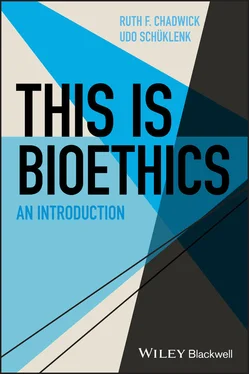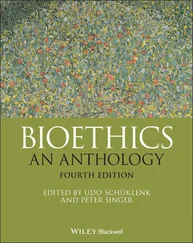1.28 You may also want to look out for arguments which purport to show that other species have rights, and the different ways in which such rights are supported.
1.29 Ethical relativist 17 arguments take various forms, but those most commonly found in bioethics go along these lines: We should not judge today terrible things that occurred in other cultures and societies many years ago. After all, perhaps what we consider unethical today was considered perfectly above board in another age. And in any case, even if we disagree with the views and practices held at the time, we surely have no ethical proof akin to scientific proof, that what occurred in the past is truly and objectively wrong.
1.30 Bernard Williams famously described this take on ethical relativism as ‘vulgar relativism’ (Williams 1974–1975). He thinks it is vulgar, because it is obviously flawed. Those who declare that it is normatively wrong to form a normative judgment on the goings‐on in a different cultural context and/or time in history would seem to form a normative judgment that, if they are correct, they would not be able to form. They hold the view ‘that “right” (can only be coherently understood as meaning) “right for a given society”; that “right for a given society” is to be understood in a functionalist sense; and that (therefore) it is wrong for people in one society to condemn, interfere with, etc., the values of another society’ (Williams 1972, 20). In Williams’ view this “is clearly inconsistent, since it makes a claim in its third proposition, about what is right and wrong in one's dealings with other societies, which uses a nonrelative sense of “right” not allowed for in the first proposition’ (Williams 1972, 21).
1.31 In some ways this issue seems also to be a bit of a red herring. The important question is not whether something that occurred in the past was morally good or bad, even though that could have a bearing on, for instance the reparations questions in the context of slavery. Rather the important question is whether today when we need to make a normative decision on whether we ought to do a certain thing or omit to do a certain thing, it would be morally right or morally wrong to do so (Williams 1974–1975). What people have done a long time ago realistically cannot assist us in answering that question. Our context today will be very different from the context potentially hundreds of years ago. Our knowledge base is different, our values will have evolved, our resource situation will be different, and so on, and so forth.
1.32 Ethical relativists tend to make two distinct claims: There is widespread disagreement on ethical questions, and this disagreement is not merely a matter of historical distance as ongoing controversies about the morality of abortion, marriage equality for same sex couples and assisted dying demonstrate. This claim is empirically uncontroversial, but the meaning of this disagreement for the possibility of ethics is still subject to controversy. After all, we cannot possibly sustain – without trying – a stance that maintains that it will be always impossible to make moral progress on these issues. The second claim is more far reaching, it suggests that there is no objective, universal and trans‐historical truth in an ethical judgment. Rather ethical judgments are a reflection of their times as it were.
1.33 What can be said with regard to these claims? For starters, it might well be true that we have no ethical proof comparable to the kind of proof you would come across in logic or physics. However, consider this: Even in the sciences, scientific paradigms (i.e. scientific truths that have been taken for granted, sometimes for centuries) are replaced radically or evolutionarily by other paradigms. After all, that is the story of science! Scientific truth then seems a more relative matter than most people are willing to concede. However, demonstrably progress is made. Change usually occurs when the old paradigm can be proven faulty and a new paradigm is better able to explain and predict the phenomenon in question. There is arguably no equivalent to this in ethics. However, progress in ethics undoubtedly occurs, too. Today we pretty much agree that slavery is unethical, and we even agree by and large on the reasons for this conclusion. In some ways progress in ethics is not dissimilar to progress that occurs in other Humanities’ disciplines. For instance, do we have incontrovertible proof of the causes that ultimately led to Hitler’s ascendancy to Chancellor in the dying days of the Republic of Weimar? Historians speak much to the causes, but truth be told, their idea of causation is very different to that of a physicist. And yet, we will still find most historians agreeing on some of the fundamental causes that led to Hitler’s coming to power. We encounter similar situations with regard to research conducted by researchers working in other disciplines, such as anthropologists, geographers, and even lawyers, yet the charge that they are unable to prove their conclusions objectively ‘right’ isn’t usually leveled against them. Perhaps progress should be measured taking into account the peculiarities and idiosyncrasies of particular disciplines.
1.34 Gordon Graham, a Scottish philosopher and ordained Anglican priest, seems to have hit the nail on its head when he writes, ‘Provided we accept that our conclusions will in all likelihood fall short of absolute proof or incontrovertible demonstration, the most plausible and intelligent approach to moral questions and disagreements is just to see how far clear and cogent reasoning – assembly of the relevant facts, analysis of the relevant concepts and adherence to the rules of logic – can take us’ (Graham 2004, 13). He goes on to say that a point of view that he describes as ‘soft objectivism’ holds ‘that for any moral matter reason may be able to point us to a resolution that (…) is clearer and more cogent than any other and which it would be logically possible but unreasonable to dispute’ (14).
1.35 That is an odd question, isn’t it? Let us first be clear though about the meaning of this question! Philosophers have, naturally, argued about that, too. What we are interested in is essentially a question about the authority of morality. Why should someone who subscribes to a particular morality, say utilitarianism, actually act according to what a consistent utilitarian analysis would conclude she ought to do when that is going to result in her losing out in some way, and others, possibly even others in far‐away lands, winning? Why act altruistically when an egoistic course of action would result in a much better pay‐off for her, others be more or less damned? Truth be told, there is no answer that we have come across that would persuade everyone, i.e. there is no answer following logically from uncontroversial normative premises. In what follows we offer a few possible answers to this question without claiming that they constitute some kind of trump card ending the debate.
1.36 Apparently, knowledge of ethics has only a limited effect on the moral behavior of ethicists themselves. Strangely, professionals who work full‐time ‘in ethics’ do not in the average appear to be much more ethical 18 than other people (Schwitzgebel 2015).
1.37 Some philosophers have argued that moral judgments in their own right provide strong reasons for acting 19 in a particular way that is guided by those moral judgments. The idea here is that moral properties such as ‘right’ and ‘good’ motivate us to act in certain ways and they do so in a manner sufficiently powerful to override other considerations, provided we have a proper understanding of what is morally required of us. Simply put, if we reflected on whether or not we ought to donate to the medical NGO described at the beginning of this chapter and we concluded that it would be the morally right thing to do for us, we are also provided with a motive for actually donating to the NGO.
Читать дальше












